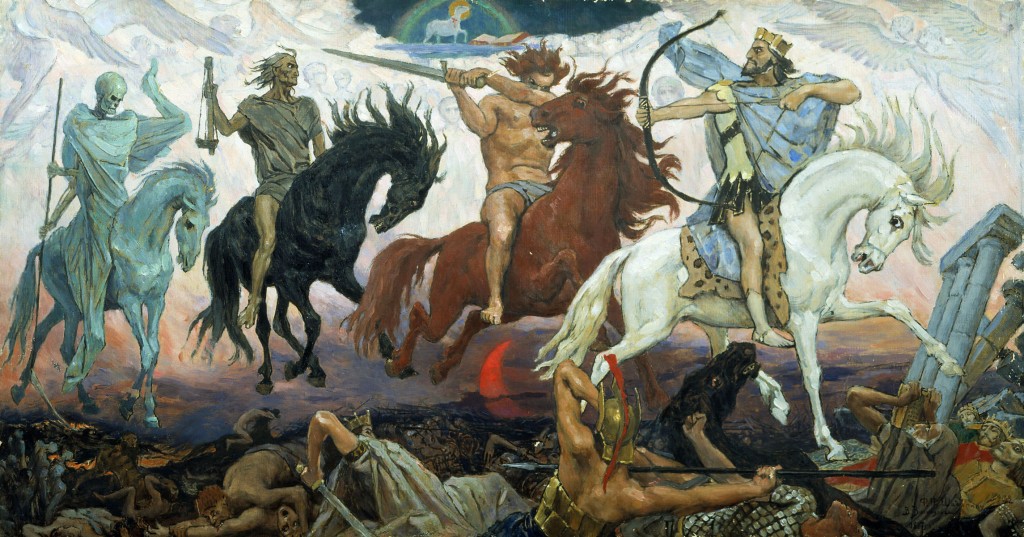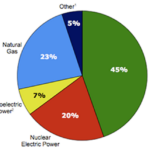
Het was onlangs, 22 april, weer de dag van de aarde waarop groenbevlogenen aandacht plegen te schenken aan het milieu met allerlei manifestaties, zoals het uitschakelen van de elektriciteit in openbare ruimten en woningen. Op zich is het goed wij zo zorgvuldig mogelijk omgaan met het milieu en dat er groepen zijn die ons daartoe aanmoedigen. Maar zij overdrijven vaak. Vorig jaar was er in ons land nog wel wat te merken van de dag van de aarde. Maar dit jaar is het mij en vele anderen ontgaan. Er lijkt een zekere vermoeidheid te zijn ingetreden.
Dit soort manifestaties passen in een bredere stroming waarbij de bevolking met grote regelmaat wordt opgeschrikt door de aankondiging van naderend onheil. In de tijd van de zondvloed kwam de waarschuwing nog van ‘boven’ in de vorm van een ‘goddelijke aanwijzing’. Thans begint het meestal met een ‘wetenschappelijke’ publicatie die op basis van modelstudies concludeert dat ons in de nabije toekomst allerlei rampen zullen treffen.
Dergelijke publicaties worden steevast gevolgd door krantenkoppen die deze apocalyptische toekomstvisioenen nog versterken, terwijl de tv vertegenwoordigers van de milieubeweging opvoert die met een van onheil bezwangerde blik bevestigen dat de toestand inderdaad zéér, zéér ernstig is. Volgens hen is het vijf voor twaalf. Dat is overigens al tientallen jaren zo.
Maar, zo voegen zij eraan toe, als de mensheid zijn gedrag verandert, is het nog niet te laat! Thans mondt dit alarmisme in de regel uit in een pleidooi voor de vermindering van de uitstoot van door de mens veroorzaakte broeikasgassen, zoals CO2, die tot een catastrofale opwarming van de aarde zouden leiden.
Maar vele onheilsprofetieën zijn niet uitgekomen, terwijl andere soorten ellende geheel onverwacht als een donderslag bij heldere hemel over ons heen kwamen.
Onder de titel, ‘7 Enviro Predictions From Earth Day 1970 That Were Just Dead Wrong’, schreef Andrew Follett voor de Daily Caller.
Ik pik er een aantal elementen uit.
Environmentalists truly believed and predicted during the first Earth Day in 1970 that the planet was doomed unless drastic actions were taken.
Humanity never quite got around to that drastic action, but environmentalists still recall the first Earth Day fondly and hold many of the predictions in high regard.
So this Earth Day, The Daily Caller News Foundation takes a look at predictions made by environmentalists around the original Earth Day in 1970 to see how they’ve held up.
Have any of these dire predictions come true? No, but that hasn’t stopped environmentalists from worrying.
From predicting the end of civilization to classic worries about peak oil, here are seven environmentalist predictions that were just flat out wrong.
1: “Civilization Will End Within 15 Or 30 Years.”
Harvard biologist Dr. George Wald warned shortly before the first Earth Day in 1970 that civilization would soon end “unless immediate action is taken against problems facing mankind.” ….
[But] civilization still exists. The percentage of Americans who are concerned about environmental threats has fallen as civilization failed to end by environmental catastrophe.
2: “100-200 Million People Per Year Will Be Starving To Death During The Next Ten Years.”
Stanford professor Dr. Paul Ehrlich declared in April 1970 that mass starvation was imminent. His dire predictions failed to materialize as the number of people living in poverty has significantly declined and the amount of food per person has steadily increased, despite population growth. The world’s Gross Domestic Product per person has immeasurably grown despite increases in population. …
3: “Population Will Inevitably And Completely Outstrip Whatever Small Increases In Food Supplies We Make.”
Paul Ehrlich also made the above claim in 1970, shortly before an agricultural revolution that caused the world’s food supply to rapidly increase. …
4: “Demographers Agree Almost Unanimously … Thirty Years From Now, The Entire World … Will Be In Famine.”
Environmentalists in 1970 truly believed in a scientific consensus predicting global famine due to population growth in the developing world, especially in India. …
India, where the famines were supposed to begin, recently became one of the world’s largest exporters of agricultural products and food supply per person in the country has drastically increased in recent years. …
5: “In A Decade, Urban Dwellers Will Have To Wear Gas Masks To Survive Air Pollution.”
Life magazine stated in January 1970 that scientist had “solid experimental and theoretical evidence” to believe that “in a decade, urban dwellers will have to wear gas masks to survive air pollution…by 1985 air pollution will have reduced the amount of sunlight reaching Earth by one half.”
Despite the prediction, air quality has been improving worldwide, according to the World Health Organization. …
6: “Childbearing [Will Be] A Punishable Crime Against Society, Unless The Parents Hold A Government License.”
David Brower, the first executive director of The Sierra Club made the above claim and went on to say that “[a]ll potential parents [should be] required to use contraceptive chemicals, the government issuing antidotes to citizens chosen for childbearing.” …
Today, the only major government to ever get close to his vision has been China, which ended its one-child policy last October.
7: “By The Year 2000 … There Won’t Be Any More Crude Oil.”
On Earth Day in 1970 ecologist Kenneth Watt famously predicted that the world would run out of oil saying, “You’ll drive up to the pump and say, ‘Fill ‘er up, buddy,’ and he’ll say, ‘I am very sorry, there isn’t any.’”
Numerous academics like Watt predicted that American oil production peaked in 1970 and would gradually decline, likely causing a global economic meltdown. However, the successful application of massive hydraulic fracturing, or fracking, caused American oil production to come roaring back and there is currently too much oil on the market. …
Lees verder hier.
Maar er zullen altijd Cassandra’s blijven bestaan. Hun onheilsprofetieën zeggen in de regel meer over hun misantropische persoonlijkheidsstructuur dan over de realiteit, lijkt mij.
Voor mijn eerdere bijdragen over klimaat en aanverwante zaken zie hier, hier, hier, hier en hier.






puntje 5, over gasmaskers en luchtvervuiling: ik kan mij zo voorstellen dat als we de sterftecijfers door de verhoging van de maximumsnelheid van 120 naar 130 kmh van Milieudefensie extrapoleren naar de luchtkwaliteit van 1970, dat het dan volstrekt onmogelijk is dat de mensheid nog bestaat.
Ach, met enkele jaren lukt het om gerobotiseerd methaanhydraten van de oceaanbodem te plukken en het fossiele brandstoffen tijdperk kan met een paar eeuwen worden verlengd.
Wat het alarmisme betreft: daar hebben we blijkbaar behoefte aan. Zie rampenfilms.
Soms schuif ik aan bij Urgenda bijeenkomsten alwaar de oude activist W.van Dieren een hoge status heeft, ondanks het feit dat zijn voorspellingen nog nooit zijn uitgekomen. Maar elke bijeenkomst krijgt dit heerschap de handen op elkaar door te beweren dat vluchtelingenstromen en IS het gevolg zijn van klimaatverandering.
Zojuist las ik op Blendle een lang artikel over voeding: de ban op verzadigde vetten, de vervanging ervan door suikers en de toename van diabetes 2. Een sterke analogie met het klimaat denken dringt zich op. Academische carrières, zwart maken van anders denkenden, wrakke theorieën, de ogen sluiten voor tegenstrijdige waarnemingen, de industrie die op de nieuwe doch gammele inzichten inspeelt zodat de trend zichzelf versterkt.
Lang geleden zag ik een cartoon waarin een groepje holbewoners rond een vuurtje zitten. De discussie verloopt aldus: 1. “wij leven in harmonie met de natuur” 2. “wij bewegen de hele dag” 3. “wij eten 100% biologisch voedsel” en tenslotte: “hoe kan het dan dat wij toch maar 35 jaar oud worden”?
David, die gemiddelde levensverwachting van niet meer dan 35 jaar is bekend van samenlevingen die op landbouw gebaseerd waren, ook nog vrij recent in Europa.
De jager-verzamelaars die er aan vooraf gingen, waren vaak wel iets beter af.
De jagers/verzamelaars werden bijna even oud als wij nu, maar zonder al onze medicijnen en hulpmiddelen. Aan beweging deden ze niet meer dan zo nu en dan achter een groot dier aanrennen en vellen, daarna hadden ze weer een week om te eten en te rusten. Sporten deden ze waarschijnlijk niet.
De landbouwers die daarna kwamen moesten veel harder werken op het land en waren daardoor misschien snel versleten. Ze werden gemiddeld circa 35 jaar oud en waren ook kleiner dan de jagers.
Ik heb dit vroeger bij geschiedenis onderwijs gehad en heb geen wetenschappelijke link.
Weet je ook wat hun gemiddelde levensverwachting was, en belangrijker nog, hoe dat is bepaald?
Het ligt voor de hand dat hygiëne de reden is. Parasieten en besmettelijke ziekten. Vooral als mensen en dieren dicht op elkaar leven. Pas na aanleg van sanitaire voorzieningen gaat in dorpen en steden de levensverwachting omhoog.
Bij dit onderwerp is er altijd het verschil tussen levensverwachting en de leeftijd die volwassenen kunnen bereiken. Anders gezegd, de levensverwachting van een pasgeboren baby is veel lager dan van een vijfjarige en die is weer lager dan van een 20 jarige. En dat komt natuurlijk doordat pasgeborenen en kinderen veel kwetsbaarder zijn dan volwassenen, ook natuurlijk omdat de volwassenen zeg maar al bewezen hebben dat ze een sterk lichaam hebben.
Dus die holbewoners bij een kampvuur, ervan uitgaande dat het volwassenen zijn, zullen gerust ook wel 50-60 of nog ouder geworden zijn. Er overleden alleen wel ontzettend veel jonge kinderen waardoor de levensverwachting laag was.
Er waren ook doemdenkers die in de jaren 70 een nieuwe ijstijd verwachtten. Of wij daadwerkelijk een periode van afkoeling tegemoet gaan is aannemelijk, maar wanneer blijft een zaak van beredeneerde gis en pas waarnemingen als het zo ver is. Interessant is wel hierbij waar toch ten eerste dat voorzorgprincipe is gebleven. Immers, een afkoeling van de orde van de Kleine IJstijd is allerminst een pretje en overtuigend catastrofaal voor bijvoorbeeld de voedselproductie. Welke maatregelen neemt men? Ik denk eerder aan selectief alarmisme van de AGW-denkers. Ten tweede ontstaat er dan een interessant dilemma voor alarmisten. Immers, als CO2 zo sterk doet opwarmen, zal men bij afkoeling heel hard fossiele brandstof moeten verbranden om die afkoeling teniet te doen. Alleen, diezelfde alarmisten roepen dat het binnen de kortste keren gedaan is met de voorraden fossiele brandstof. Wat moeten we dan beginnen? Tegen dit soort vraagstukken lopen alarmisten aan doordat zij wel een hoop doemdenken spuien, maar nog steeds niet het bewijs hebben geleverd dat geen enkele natuurlijke factor (aards of buitenaards) een rol speelt bij klimaatverandering, maar waar de menselijke als enige een rol speelt. Deze bewijslast ligt nog steeds bij de alarmisten, maar die geven niet thuis.
Uw artikel over thorium (Groene Rekenkamer) heb ik inmiddels op FaceBook gedeeld.